|
FAQs on Parrot, Jelly-Bean... Cichlids, Disease/Health
3
FAQs on Parrot Disease:
Parrot
Cichlid Health 1, Parrot
Cichlid Disease 2, Parrot Cichlid
Disease 4, Parrot Cichlid Disease ,
FAQs on Parrot Cichlid Disease by Category:
Diagnosis,
Environmental,
Nutritional (e.g. HLLE),
Social,
Infectious (Virus,
Bacterial, Fungal), Parasitic (Ich, Velvet...),
Genetic,
Treatments,
Related Articles: Blood Parrots & Flowerhorn
Cichlids: maintenance and healthcare of two popular hybrid
cichlids by Neale Monks, Neotropical Cichlids, African Cichlids, Dwarf South American Cichlids, Cichlid Fishes in General,
Related FAQs:
Parrot Cichlids 1, Parrot Cichlids
2, &
Parrot Cichlid Identification,
Parrot Cichlid Behavior, Parrot Cichlid Compatibility, Parrot Cichlid Selection, Parrot Cichlid Systems, Parrot Cichlid Feeding, Parrot Cichlid Reproduction,
|
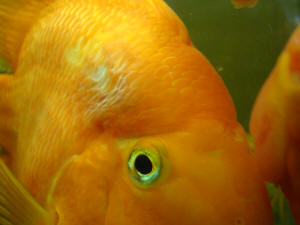
|
Cichlid Question 8/13/13
Hey guys!
I have a question after reading your FAQ page. I have one
Jellybean Cichlid I've had for over 10 years. He is in a 75 gallon tank.
Water quality is great, feeding pellet food, has been healthy. Last week
stopped eating.
Swimming slower and hiding a bit more. Did a 25% water change (last
water change was 2 weeks ago). Filters working well. Did
another water change last night. He started to look bloated and
still wasn't eating so I removed the carbon and added Metron to the tank
per the directions - that was last night.
Now he is upside down at the bottom of the tank, gasping for air, and he
color is very deep orange. What am I doing wrong?
HELP!
Brenda
<Hello Brenda. The short answer is that without seeing the fish and
reviewing its aquarium, it's hard to be sure. But some factors are worth
considering:
(1) Constipation can and does cause problems for fish, especially
"deformed" varieties like fancy Goldfish and Blood Parrot (= Jellybean)
cichlids. The problem for these fish is that their spines are deformed
and their swim bladders displaced, and these factors make is difficult
for them to balance properly. Constipation is, of course, a solid lump
in the digestive tract, and if that causes the centre of mass to shift,
it's possible for the fish to find it difficult to maintain its correct
orientation. Some writers here at WWM refer to this as "floaty, bloaty
goldfish" syndrome. Diet is often the key factor, a lack of fibre being
what causes constipation, and both Goldfish and Blood Parrots (indeed,
most cichlids) would be partly or primarily herbivorous in the wild, so
given a processed diet based around flakes and meaty foods like
bloodworms, they often end up constipated. It's easily fixed though;
read here:
http://www.wetwebmedia.com/fwsubwebindex/gldfshmalnut.htm
http://www.wetwebmedia.com/fwsubwebindex/SaltUseFWArtNeale.htm
(2) Water quality is another issue. Your fish is fairly old, cichlids of
this size and origins tending to live for around 10-12 years, sometimes
more. A water quality "dip" that might have been shrugged off by a
younger fish could be hard work, even fatal, to an older fish. Keeping
up with water changes, and certainly ensuring 0 ammonia and 0 nitrite,
will go a long way to putting this right. Provided no other symptoms
(like Finrot) appear, there's no treatment necessary, just time and good
water quality.
Do also ensure the water has moderate hardness to buffer against pH
drops between water changes. Blood Parrots are hybrids of uncertain
origins but likely from Central American cichlids, so you're aiming for
10-20 degrees dH, pH 7-8. Exact values don't matter, but water chemistry
should be staple, and rapid pH drop in particular can make hard water
cichlids go "loopy", spinning about as if they can't control themselves.
In short, monitor water quality, add some Epsom salt, and switch to a
greens-based diet until the fish recovers. Nothing difficult or
expensive!
Good luck, Neale.>
Re: Cichlid Question 8/13/13
Neale
Thank you for the advice.
<Welcome.>
Unfortunately he died last night.
<Sorry to hear this.>
He was the last parrot fish in my tank.. I used to have two of the same
age. The last one passed away about 3 months ago under similar
circumstances.
<I see.>
I do partial water changes every 2 to 3 weeks and change the filters at
that time. A day or two later I check the water quality... this
time the nitrates and nitrites were both at 0. the ammonia level
was also 0, pH 8.5, but the alkalinity was high (>300) even after 3
partial water changes.
These tests were done using test strips... should I lower the alkalinity
and pH? I was under the impression that parrot fish like a higher
pH...
<They do; if water chemistry is stable and alkaline, I wouldn't worry
too much about the precise values. In other words, if you've had success
with Central American cichlids in this kind of water, and you have,
stick with it. Of course, yes, this water is not ideal for, say, South
American cichlids.>
Now I'm trying to decide if I should add new fish to the tank... I
cleaned it today and will let it sit a day or two before checking the
water again.
I'm worried that I'm missing something and I don't want to subject new
fish to whatever's wrong.
Any further advice? I already miss my fish:(
<If the tank is empty, keep adding pinches of fish flake every couple
days to give the biological filter something to feed on, otherwise the
bacteria will die back.>
Brenda
<Cheers, Neale.>
Aged blood parrot cichlid, abscess
recurring 7/26/13
Hi crew,
<Brian>
I've written before about my 14 year old blood parrot cichlid who had slowly
lost much of her fins and too many scales at the base of her fins, but I'm
hoping for some advice again.
A couple months ago she developed an abscess on her head just above an eye.
It started as a dark patch, then grew to a bulge and then split or erupted
into a brownish, whitish lump with cauliflower sort of texture that
eventually flaked off. It healed over quickly, leaving a slightly pitted
area. Now she has another one forming in just about the same spot (photo
attached). Last time I treated the water with Metronidazole and Kanamycin as
it got close to bursting to try to avoid secondary infection, which seemed
to be successful (or unnecessary).
<Ahh>
I've tried giving her medicated food but she seems to despise the taste of
Metronidazole. I used a Repashy gel food mix, which she devours on its own,
but refuses when I have Metronidazole mixed in. Can you suggest any
alternative systemic medications that might be effective and not taste so
bad it will be refused?
<Mmm; no... I would not try to treat this condition directly. Not likely
worthwhile/effective; and much to be lost (nitrifying bacteria; impacts to
immune system, kidney/nephric damage) by exposure>
Other than keeping her water pristine for which I continue to do all I can
with water changes, can you offer any further tips?
<There are none as far as I'm aware. With fishes of this sort/make up
genetically, there is only so much "replicative error accumulation" that
individuals can/do resist... senescence/"old age" is likely the real arbiter
here>
Perhaps Epsom salts to try to draw out fluid?
<Perhaps a low dose... a level teaspoon per five gallons...>
Treat the water again with Kanamycin and Metronidazole, or something else,
or not at all?
<Not a fan of either antibiotics nor the Flagyl here... rationale gone over
and over on WWM>
I don't think we could starve her into eating the Metronidazole. Through it
all she has stayed active and does not appear to be in distress.
Thanks,
-Brian Pardy (Vermont)
<I would learn to tolerate the growths/abscesses as "marks of age". Bob
Fenner<> |
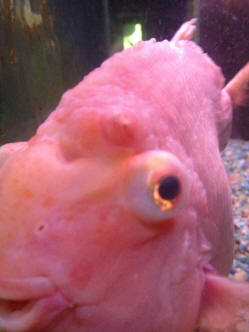 |
|
Blood Red Cichlid needs help
7/11/13
As you can see by the attached pic, my blood red has had this
hanging out of it for over a month..The fish has lost or is losing its
color. Appetite etc seems normal and the three other blood reds in the
tank are doing fine. How can I help this situation? Lene
<This would appear to be a prolapse… invariably a function of poor
environment and inappropriate diet. Medicate with Metronidazole and
Nitrofuranace. Do read here for more:
http://www.wetwebmedia.com/fwsubwebindex/OscarDisF8.htm , searching
for "prolapse" on that page for examples of this situation. Cheers,
Neale
|
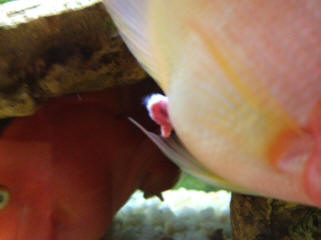 |
Re: Blood Red Cichlid needs help
7/11/13
Thank you very much. I've already found a place here that carries what
you've recommended so ill be taking care of the situation ASAP.
Mahalo, Lene
<Good luck with the treatment.>
Sent from my paddle board..I wish!!
<Ha! Cheers, Neale.> Blood Red Cichlid
needs help 7/13/13
> Bloated Red Parrot Cichlid
> As you can see by the attached pic, my blood red has had this
hanging out of it for over a month..The fish has lost or is losing its
color.
Appetite etc seems normal and the three other blood reds in the tank are
doing fine. How can I help this situation? lene
< Your Parrot cichlid has an internal blockage that has developed into a
prolapsed anus. The internal pressure is usually caused from bacteria in the
gut breaking down the food in the intestines or a fatty liver from a poor
diet. Since he is still eating I would recommend placing him in a hospital
tank and putting him on a diet of fish food with a vegetable base like a
Spirulina flake. Watch that the prolapsed tissues don't become infected or
damaged. so add a little salt to the water to keep a protective slim over
the tissues. Chuck.
Re: Blood Red Cichlid needs help 7/13/13
Thank you Chuck, i will do so and I already have the medication that another
of your crew members suggested. I'll let you know how this turns out.
Re: Blood Red Cichlid needs help
8/1/13
Bloated Parrot Cichlid Doing Better and foods/fdg./nutr.
Just wanted to thank you'll for your advise. My cichlid of interest
is doing well! I have them all on Spirulina flakes, bloodworms and
cichlids pellets. Alternating the variety. Also the prolapsed anus
is "gone" not sure how that happened..would it have gone back into
the body?
<Yes, it was reabsorbed into the body cavity.>
It's color still fades occasionally, then returns...any suggestions for
that?
< I would feed the bloodworms sparingly. Watch the fish carefully after
each different food is fed and see if there is a correlation between the
type of food and the loss of color.>
The other3 blood reds are doing fine.
< Glad to hear we were able to help.-Chuck>
Re: Blood Red Cichlid needs help /RMF Oops
8/2/13
Why sparingly with the bloodworms?
<Linked/links to disease... as you were directed, search WWM re>
Just curious..and are there other foods you would suggest,
frozen or otherwise?
<... this too; along w/ Foods FAQs for Parrot Cichlids. B>
Re: Blood Red Cichlid needs help, fdg.
8/2/13
So, I though<t> about my feeding routine. In the morning its either the
Spirulina flakes or pellets and in the evening its the frozen blood
worms..as for the fish in question, it's color is darkest in the
mornings (after the evening bloodworms) any suggestions for a
routine?
<Twice a day is fine... I'd offer meaty foods in the AM; giving fishes
time to find, consume all. B>
Link Re: Blood Red Cichlid foods/feeding/nutr.
8/2/13
http://www.wetwebmedia.com/FWSubWebIndex/parrotcicfdgf.htm
Re: Link Re: Blood Red Cichlid foods/feeding/nutr.
8/2/13
Okay I'll switch them around! Thanks!
<Ah good. Welcome. BobF>
|
My PARROT FISH... hlth., no data
6/6/13
I have three blood parrot fish. The last two days they haven't
eaten and are laying on their sides.
<Something wrong here. DO a massive (like 50%) water change... check
your system for faulty gear, ammonia...>
Sometimes they lay all together and have been staying there for long
periods. Then they separate and just stay on their sides. We've
had these fish for a very long time and really love having them. One of
them is worse then the others and we're sure is dying. Anything we can
do??
<Yes; the water change/s... and write back re your water quality tests,
what equipment you have, décor (some may be toxic), foods/feeding. Have
you read here:
http://www.wetwebmedia.com/FHParrotDisArtNeale.htm
and the linked files above? Do so. Bob Fenner>
Parrot Fish Age Question /Illness
4/20/13
Hello!
<Brenda (my oldest sis name also)>
I currently have 2 parrot fish that are approximately 10+ years old
living in a 75 gallon tank. The water quality is good, gets
partially changed every 3 weeks (including filters) (approx 25 %) and
has been since I set up the tank 10 years ago. The last 2 weeks
one of the fish has been off food so I did a partial water change and no
improvement. The past 24 hours he has been sitting on the bottom
of the tank not doing much.
<I'd be measuring water quality... e.g. is there more than 20 ppm of
nitrate here?>
I'm not sure what to do next?! At first I assumed perhaps he's
dying of old age, but would hate to make that assumption.
Any suggestions?
<... read here:
http://www.wetwebmedia.com/FHParrotDisArtNeale.htm
and the linked files above. Bob Fenner>
Brenda
Re: Parrot Fish Age Question /Illness
4/21/13
Bob
<Bren>
Thank you for the quick response but unfortunately, my fish died during
the night:(
<Ahh!>
I do keep a close eye on water quality and have for the past 10 years
and the fish have been extremely healthy with no problems. I know
how easy it is for fish to get sick with overcrowding and poor water
quality and that all appears to be good.
<Mmm... well...>
Is it possible he died of old age? I've done some research on your
website and I find a lot of references to 7 years of age as being "old"
but it doesn't say what the typical life span is for the parrotfish.
<Ten years is not uncommon, but a good long time. Could be "cumulative
genetic/replicant defects" (senescence) at play here...>
As usual I appreciate all your help!
Brenda
<Certainly welcome. BobF>
|
Follow-up on dwarf gourami disease treatment, new Q on
cichlid with fin/scale loss
(RMF, comments on last bit, re: Fin loss) <<Nothing further>>
3/10/13
Hi crew!
<Brian,>
Back in Mar 2007, I reported to WWM about a successful treatment of
apparent dwarf gourami disease with Metronidazole/Praziquantel food and
erythromycin in the tank water. That fish survived and thrived for many
months afterwards. My original post an your response is at
http://www.wetwebmedia.com/fwsubwebindex/dwfgourfaqs.htm ,
heading "Dwarf gourami disorder... and successful trtmt. 3/3/07".
<Indeed.>
Six years later we took the plunge and got some more dwarf gouramis,
hoping the industry had cleaned up its act. It hasn't. Of six we bought,
three are left, and the last two that were acting well are doing so no
longer.
<I do agree; the quality of Colisa lalia in the trade is variable, often
poor, and it seems logical (to me) that some enterprising breeders in
Europe or the US might concentrate on breeding good quality specimens
for the more discerning segment of the market. I'd certainly pay 50-100%
more for a specimen I thought'd last more than the usual measly 6
months...>
My question for you: since that post six years ago, have you ever heard
of any other successful treatment of DGD with this regimen?
<No. One huge problem with your report is that not all Dwarf Gouramis
exhibiting "Dwarf Gourami Disease" have the virus we now call DGIV; at
least as many are suffering from Mycobacteria spp infections (what we
often, but very debatably, call Fish TB), and that's putting aside all
those specimens that die from simple poor care (wrong water chemistry
and temperature being particularly relevant here). So your successful
regimen could easily have cured a Mycobacteria infection, something that
isn't exactly common, but isn't theoretically impossible either. Curing
viral infections is a whole other ball game, and the drugs you mention
aren't like to have much, if any, anti-viral properties.>
I'm about to try to find similar medicated food and give it a shot. I'm
not sure if our gourami that survived this long ago was typical of the
species or just had some amazing recuperative powers.
<Impossible to say: a real drug trial would involve identifying the
pathogen(s) involved, controlling all other possible variables, and
repeating the experiment many times, none of which you did.>
On a side note, are you aware of any info regarding how long the
Iridovirus or other DGD-causative agents can last in a gourami-free tank
without UV sterilisation?
<Nope, not aware of anything specifically, though UV can reduce microbe
counts (including viruses) in the water, though rarely 100%, so while UV
reduces risks of diseases spreading, it doesn't eliminate the risk and
of course doesn't cure already infected fish.>
Later we may try some of the non-dwarf gouramis, but would like to know
how long before (if ever) some clean locally bred dwarf gouramis could
live in the tank again.
<It's always worth a shot. Be sensible and shop for healthy specimens
from reliable dealers and avoiding any specimens from tanks with sickly
fish.>
A final question on another subject. We have a 13 year old blood
parrot cichlid that has slowly lost most of her fins and has
also lost some of the scales at the base of her fins where the fin loss
has progressed. I've used various antibiotics before to try to halt it
with minimal luck, only Seachem's Para Guard has seemed to slow it
temporarily. This all has happened over the last few years. Do you have
any other suggestions for treatment apart from keeping nitrates down?
I've attached a photo showing what I mean.
<This reminds me a lot of what you see on Tangs/Surgeonfish from time to
time. It's a combination of HLLE (head-and-lateral-line erosion) that
allows tissue, including fin membrane, to erode and become infected with
Finrot-type bacteria. At least two factors seem to be key, Hexamita
parasites and a lack of fresh greens (i.e., vitamins) in the diet.
Cichlids are closely related to Tangs (they're both advanced perciforms)
and such groups seem far more prone to HLLE than more primitive groups
like cyprinids and catfish. Also, given that most cichlids consume fresh
greens in their diet in the wild, what we feed them in captivity isn't
an especially good match for what they need, and this is probably one
reason why Hexamita infections (especially in the hole-in-the-head form)
are so very, VERY common among cichlids. There's no cure, but given the
age of your Blood Parrot, a cure may not be needed anyway. Review diet,
keep nitrate levels as low as practical, and if you can, treat with
Metronidazole, about the only thing that works against Hexamita
reliably.>
Thanks for all you do for so many fish and fishkeepers!
-Brian
<Most welcome, Neale.>
|
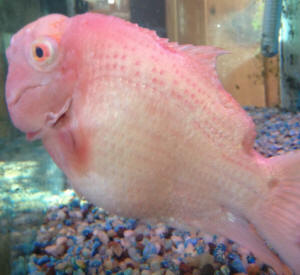 |
Re: (RMF, comments on last bit, re:
Fin loss) re: Follow-up on dwarf gourami disease treatment, new Q on cichlid
with fin/scale loss
3/10/13
Thank you Neale and RMF for your comments!
<Ah, Bob's comments to follow; do look at tonight or tomorrow's batch of
Daily FAQs and you'll see his comments, if he has any.>
I can certainly buy the Metronidazole/Praziquantel treatment as having cured
a Mycobacterium infection much more than anything viral. Thanks for this
additional information, I hadn't kept up enough to hear that something other
than DGIV was appearing causative.
<Hmm… do read:
http://www.wetwebmedia.com/ca/volume_6/volume_6_2/mycobactera.htm
What we call Dwarf Gourami Disease is likely a range of infections,
including Mycobacteria (i.e., bacterial) infections and DGIV (i.e., viral)
infections.>
I appreciate the suggestion of Metronidazole for our cichlid. I've just
starting using the Repashy food paste mix to fee her and this will be
perfect to give her internal meds. I'll continue working on nitrate and get
her more fresh veggie matter. Her fins may not regenerate but she's strong
and appears to be getting by.
<Precisely. So if she's basically happy now, after some years of this
ongoing problem, there's no real point doing anything drastic just for the
sake of treating.>
At least she has finally stopped laying eggs, it exhausted her so much every
time we feared she would fan herself to death.
<Indeed, a common problem in captivity. In the wild, female fish will have
some respectable period in between mating and broodcare events, during which
time they'd get themselves properly fed and lay down some fat. Fish can and
do wear themselves out through continually spawning in aquaria, especially
females, and doubly so for mouthbrooders (which can't feed while incubating
eggs).>
Thank you both very much!
<Welcome, Neale.> |
|
Parrotfish disease? 2/19/13
Dear staff,
I have had this parrotfish for over 4 years and he is ~5" in size. About a
week ago, he started developing this lesion on his head.
<An infection in one of its lateral line pores; not uncommon>
It looks like a little hole in the head with a sort of white pimple (one or
more - hard to tell) inside. Any ideas what this might be? or how to treat
it?
Thanks!
Eddie
<Often attributed to Octomita/Hexamita infestation/s... but this is only
secondary to some issue/s of water quality and probably nutrition. Let's
have you read re the related HLLE:
http://www.wetwebmedia.com/FWSubWebIndex/FWHLLEf2.htm
and the linked files above. Bob Fenner>
|
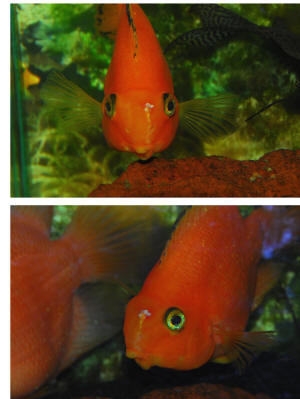 |
|
Jelly bean parrot, painted, beh.
1/30/13
I obtained my jellybean parrot a week or so after Christmas..as time
went by its color changed. I read how you are against painted fish, and
I understand why now though I didn't at the time I got it. This fish
used to be purple (my favorite color) so I was too excited to think
about the hurt the fish went through for it. I was informed that the
fish would change color over time so when the purple faded and the fish
started to look darker I didn't think anything of it. Though today I
noticed how progressively dark it got.. Almost its whole head turned
black in large blotches. I know this could be its natural color but I
was wondering if maybe it was a bad thing.
<Might be... I'd be keeping an eye on the other fish it's with. The
minnow shark in your pic may be bullying it. Bob Fenner>
|
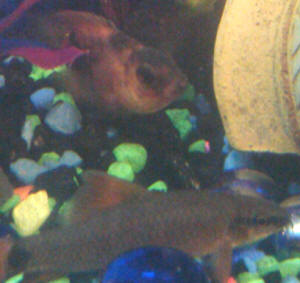
|
Re: Jelly bean parrot 1/30/13
So you think it could be caused by stress if not natural coloring?
<Yes>
I just thought it was odd how dark it became. I found a picture of what it
used to look like, and I got a better picture of it now.
By the way, the sharks don't bother it.
<They can/do in time. BobF>
|
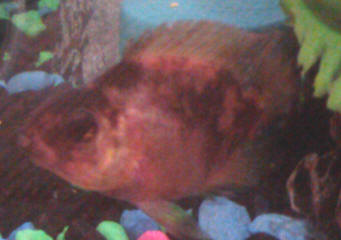 |
|
|
Please Help my blood parrot is very sick and I need help
6/4/12
Hello I hope you can help me, I have a 20 gallon tank with 1 blood
parrot I have had about 9 years.
<A fair age for this fish, but I am surprised it has done so well in an
aquarium so small.>
It has a penguin bio wheel 150 and 1 bubbler. She started 8 days ago
with her tail curling the local aquarium store recommended Furan-2
because she seemed to have a small red spot on fin under her belly,
closest to body. I removed the filter cartridge dosed medication, waited
24 hours, dosed again, 24 hours later did 25%water change, repeated
entire cycle once and did final water change.
<I see.>
I put filter cartridge back in on Friday (June 1) at about 6pm,she
started acting funny hanging at the bottom. She has only eaten once all
week.
<Cichlid appetite is proportional to their health. Don't worry about
disinterest in food -- think about why she's stressed or sick. When
things improve, ailing cichlids recover their appetites very quickly.>
At 11:30 pm she was on the bottom all curled up breathing very heavy. I
tested water and ammonia was 6.
<Lethal.>
I did 30% water change and 1 hour later I did another 20% water change.
She still isn't improving so I went to the aquarium store again and they
said to try tetra parasite guard but do not take out filter this time
just give it a try to see if
she has any reaction.
<Stop randomly adding medications; you are likely poisoning your fish.>
So I did this on Saturday and she moved a little still curled up on
bottom and breathing heavy. Repeated Parasite Guard and removed
carbon from filter cartridge she seems to want to swim but cannot right
herself.
<You hadn't removed the carbon beforehand? When you were using the
Furan-2?>
Is there anything I can do I really want to help her. Thank-you for your
time, Elizabeth T
<There's something environmental going on here if you're getting ammonia
readings of 6 mg/l -- either the filter isn't working, there's a dead
rat in the tank, or something… you do need to establish why the filter
isn't removing all the ammonia. Wrangle the ammonia and nitrite levels
back to 0. This may take time. Stop with random medications -- besides
killing the fish, they can kill filter bacteria. Meantime read here:
http://www.wetwebmedia.com/FHParrotDisArtNeale.htm
Your tank is too small, so that's one stress factor; review your
aquarium and maintenance procedures and see if you can find others. Then
fix them. Cheers, Neale.>
Re: Please Help my blood parrot is very sick and I need help
6/5/12
Hello-I am still struggling watching my fish curled up trying so hard to
straighten out and swim.
<I would imagine.>
I removed the entire filter cartridge when I used Furan-2,
<Why?>
the aquarium store told me only the charcoal was to have been taken out.
<Correct. Indeed, I would recommend (strongly) you only ever use carbon
in very specific situations where you absolutely must use it. Most
aquarists keeping freshwater fish don't need carbon.>
I misunderstood and combined with trying to feed her and her not eating
I think the food decaying caused the ammonia to go up.
<Likely so.>
I have had zero readings since water changes Fri night and the nitrite
also read zero.
<Good.>
Could I have changed too much water too fast,
<Yes, but unlikely to be fatal.>
can she still have the hope of recovery?
<Without seeing the fish and understanding what the problem might be, I
cannot say.>
She is so curved I do not know what to do.
<Neurological… like a spasm or tetanus. Happens with fish, usually under
severe stress or sickness.>
The aquarium store has never heard of a fish curling up like this.
<Odd.>
I have not added any more meds I will do a water change and replace a
filter cartridge with charcoal if you think that will be ok.
<I would not use carbon unless you suspect poisoning. Ammonia and
nitrite are removed by biological filtration, and nitrate is diluted
through water changes. Carbon does very little of benefit in most
freshwater tanks, but is useful in situations where you suspect
poisoning (specifically, excessive medication, accidental introduction
of pesticides, etc.).>
I feel like everything I do only makes her worse.
<May well feel like this if the fish is slipping towards death, and at 9
years of age, there may be little you can do to help if that's what's
going on. But as I said last time, make sure you read about what
these fish need, check the environment (water chemistry as well as water
quality) and act accordingly.>
Thank you for your time and quick response, Elizabeth
<Welcome, Neale.>
Re: Please Help my blood parrot is very sick and I need help
6/5/12
Hello again I am sorry to bother you again I have taken some pictures to
see what you think.
<Yikes! Two things are apparent here. Firstly, the fish is very
underweight. The second is that it has horrible muscle contractions.
Poisoning is the most obvious culprit, possibly ammonia and/or nitrite,
but excessive use of medications, copper, chlorine and household toxins
such as insecticide and paint fumes are all possibilities. Do be aware
poisons don't have to be applied to the tank directly -- insecticides
could be use in the room and still be dangerous. Adding objects to the
aquarium can have the same effect, such as wood from the garden that was
sprayed with pesticides.>
I have read the articles you recommended, I actually read them last
weekend when this began because I did not want to bother you if I could
help it but now I am desperate.
<I would be too.>
The water tests were all normal last weekend through my testing and the
aquarium store so I took their advice and used the Furan-2.
<Please, I do need the numbers, not your interpretations of them. What
is the ammonia or nitrite level? What is the hardness? What is the pH?>
Now I am so confused so many variables in this equation.
<I would do a series of water changes today, taking great care that the
new water was dechlorinated with a water conditioner than removes not
just chlorine but also chloramine, copper, and ammonia from tap water.
Also take care temperature changes are minimised with each water change.
I'd do something like 20-25% every couple of hours, so that you can
clear out most of the old water from the tank after half a dozen
changes. Secondly, I'd force-feed the fish a tiny amount of minced prawn
or white fish fillet.
Hold the fish firmly with wet hands, and then push a tiny bit of food
into the throat using a thin, blunt instrument like a deliberately
blunted cocktail stick. The idea is to push the food far enough the fish
instinctively swallows it. One small bit of food maybe 5 mm across
should be ample for today. Thirdly, I'd maximise oxygenation of the
water, either by adding an airstone or buy lowering the water level so
the outflow from the filter is 1-2 cm above the waterline (remember that
motors inside internal canister filters need to be submerged to work
safely, so these can't be raised much above the waterline). Fourthly,
I'd brace yourself for death here, and in fact I'd likely euthanise this
fish by the end of the day if it showed no signs of improvement; see
here:
http://www.wetwebmedia.com/euthanasia.htm
30 drops of clove oil in one litre of water does the job painlessly and
cleanly.>
Thank you again for your time, Elizabeth
<Welcome, Neale.>
|
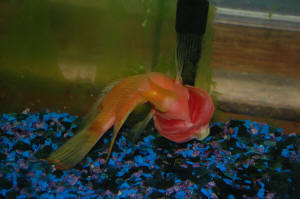
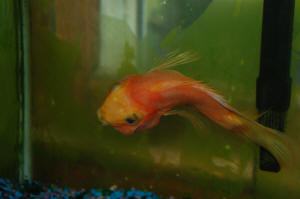 |
help for parrot cichlids
4/26/12
hello! its me Suraj Aryal from Nepal. i have an aquarium of 60
ltr capacity, where i have kept a male Flowerhorn and female parrot chic
lid and a red eared toto together,
<Why are you keeping a turtle with fish? Very bad.>
one day i saw them(Flowerhorn and parrot) spawning so i removed toto and
let them breed, but now my parrot has gone abnormal, she lies in upper
side touching surface with her mouth and she has got some black spots
too......... i regularly change my water(25% per week) use some medicine
to remove harmful chemicals....... while talking about Flowerhorn he
loves her and try to take care of her.
<Doesn't sound very likely. They are just fish after all…>
please help me to make my parrot healthy,
<The aquarium is too small. You have also provided no useful information
about their environment or diet. So, start reading here, Suraj:
http://www.wetwebmedia.com/fwsubwebindex/FHParrotCichArtNeale.htm
Then read here:
http://www.wetwebmedia.com/fwsubwebindex/cichliddisfaq4.htm
Most fish diseases are caused by their environment. Cheers, Neale.>
|
Swollen stomach or anal! Need data!
-- 1/3/12
Hi. My blood parrot have a swollen piece on the bottom of its
body.
<I see this>
This scares me because I have never seen anything like it. My
fish also became pale whitish. In the seven years that I have it,
is this the first time I see it. Is the fish pregnant?
<Mmm, not likely, though this could be evidence of egg
binding.... it's much more likely indicative of an issue w/
foods/feeding, water quality... which you haven't provided
any data re. Please read here:
http://www.wetwebmedia.com/FWSubWebIndex/parrotcicfdgf.htm
and the linked files above... for input and examples of what
we're looking for info. wise. Bob Fenner>
|
|
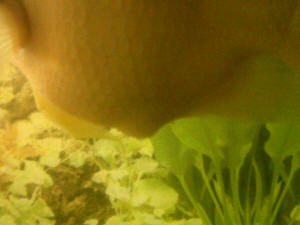
|
Red Parrot Cichlid swimming on its side
12/11/11
Hi WWM team,
<Hello!>
I have a tank of 4 red parrot cichlids and 2 clown loaches in a
15 gallon tank.
<Is this a mistake? Do you mean 150 gallons? There is no way you can
keep all these fish healthy in 15 gallons of water.>
The parrots are about the size of an adult palm, and the clown
loaches are about 7cm in length.
<Much too large for 15 gallons.>
For the past 4 days, one of the parrots began having problems keeping
its balance, and have since been floating on its side at the top of the
tank.
<Could be several things. Constipation is one. Blood Parrots are
deformed fish, and constipation causes them especially serious
problems. All fish can lose their balance when constipated, but Blood
Parrots, like Fancy Goldfish, are affected more quickly and more
severely because their digestive tracts and swim bladders are
deformed.>
It continues to feed, although eats less than it usually would, and is
still responsive when I trace my fingers on the tank. It has lost some
colour, but very minimally, and still looks alright and its eyes are
still clear.
<Good.>
Because it is floating at the top of the tank on its side, one side of
its fin keeps flapping air and water and I am very afraid that if this
keeps up, one side could end up drying.
<A very real problem.>
Would love to have some advise, and know if this condition is fatal to
the fish.
<Not necessarily. Do read:
http://www.wetwebmedia.com/fwsubwebindex/gldfshmalnut.htm
>
My other parrots and loaches appear fine and not affected by the
floating parrot. They also did not bully or harass it.
Thank you.
Kristine.
<Cheers, Neale.>
Re: Red Parrot Cichlid swimming on its side 12/11/11
Hi Neale,
Thank you for your prompt response! Yes, it was a typo. 150 gallons. I
will try changing the variety of plants and tweaking their diet to see
if that helps :)
Kristine
<Real good. Cooked peas and spinach are usually taken by Blood
Parrots and most other fish, especially if these fish are starved for a
few days beforehand. Live brine shrimp and live daphnia have a laxative
effect, too.
Epsom salt (not regular salt) is very, very useful in these
situations;
read towards the end of the follow page:
http://www.wetwebmedia.com/fwsubwebindex/SaltUseFWArtNeale.htm
Cheers, Neale.>
Red Parrot, hlth. 11/24/11
Hi,
<Hello Max>
Hope you can help. I have a 55 Gallon Tank with 5 medium sized Red
Parrots that I've had for about 5 years. After going away on
vacation and leaving the care of the tank to a friend .... who
didn't notice that the power went out and that the filters shut off
... one of my parrots became ill. It started out hiding in a corner,
never eating. After bringing my tank back to normal, the other fish
seem to be doing great ... but this one never recovered. Over the past
3 months ...... yes 3 MONTH .... I've managed to keep it alive by
keeping it in a small plastic side tank (the kind you see in fish
stores when they are separating fish to be bought). Even though
it's on it's side, I change the water daily (using water from
the tank), add aquarium salt, tried various medications .... and have
been able to "force feed" it by using (frozen) brine. I
defrost ..... allow it to inhale/eat some ..... then clean the rest
out. It's surviving, breathing ... but laying on it's side.
It's eating .... does defecate "a little". Not sure if it
will ever become normal.
<Not likely>
But how can it have survived this long???
<Fishes are generally very tough>
I hate to give up since it's still breathing and eat.
Help???
Max
<I'd place this fish in a floating plastic colander in the main
tank itself... to provide better, consistent water quality. I too hate
to give up. Bob Fenner, who suspects some sort of psychological input
here>
Re: Red Parrot 11/25/11
Thanks Bob .... I'll try my best.
<Real good Max. BobF>
Re: Red Parrot 11/28/11
Hi Bob,
On a better note, it looks like one of my parrots laid eggs on a piece
of slate in my tank. What do I do next?
<? Read: http://www.wetwebmedia.com/FWSubWebIndex/parrotcicreprof.htm
and the linked files above. Search before writing us. B>
|
My blood parrot's gills have changed. --
11/08/11
<Where did you miss that we only accept image work in hundreds
of Kbytes?>
Hi, I have a 10 year old blood parrot and a year old Pleco in a
55 gallon tank with a Penguin 350 and a Penguin 200 power filter
both from Marineland with bio wheel. Over the past three weeks or
so, I noticed my blood parrot's gills changing. The edges
have become very thin and papery (I say for lack of a better
word.). They have also curled up some on the top and very bottom
and are very pale and grayish in color. I have checked everything
possible. The water quality and chemistry is all great; I'd
have a really angry fish otherwise. She always brings her
floating glass fish to the front of the aquarium when things
aren't right,
>?>
and she has one color fish for each issue.
<Time for an intervention?>
Still, though, once I noticed the changes, I checked everything
(pH, ammonia, nitrite, temperature) and all is normal. She seems
to have no concern about it; she stills eats and swims normally.
There is no change in her personality or actions; she's still
a little devil ;). I apologize for the pictures; it'll be
difficult if not impossible to see what I'm talking about
being as she did not want her picture taken. Luckily she loves to
sit in your hand, so I was able to get a few decent ones taken
that way. Also, as you may be able to see a little bit in the
second picture, all of her fins, except her pectorals, are
starting to kink or become wavy. Overall, she is healthy.
She's not visibly sick nor diseased.
<... either an anomaly in water quality... for which you
likely, there is no likely test for hobbyists... Or simple
genetics have unfolded to reveal this malformation. I'd be
doing the usual default sequential water changes, look about for
anything (new) that may be mal-affecting water make-up (and
removing it) the use of chemical filtrants (e.g. activated
carbon)...
Otherwise... ten years is a ripe old age for this mutant cross.
Bob Fenner>
|
|
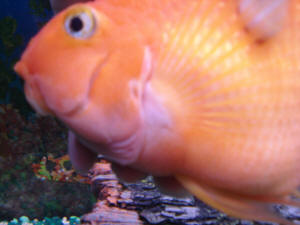 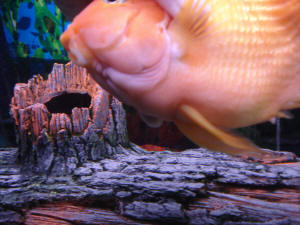
|
Re: My blood parrot's gills have
changed. -- 11/08/11
Well, I apologize; I did resize my pictures through Windows Live
Photo Gallery, but apparently it didn't take. And there is no
reason to be rude, I know she's old: I've taken very good
care of her for her to reach that age. Time for an intervention??
Really? The fish is smart; it may be odd and people may call me
crazy,
<Don't listen to them>
but it's what she does. You know I think it's really sorry
that you want to talk to someone like this who's just looking
for some help. I read the four forums on the website, looked
through dozens of links on Google, and thought I could get an
answer from you.
<You did>
And you want to talk about me? On several of the forums, there were
people who had no idea about anything. The crayfish killing the
fish, what's a nitrAte,
<NO3>
ten large fish in a small aquarium, etc., and not a single response
is as rude as you've been to me. Thanks for nothing.
<As welcome> |
|
fish sickness inquiry
8/18/11
Hi,
Please check the pics, I don't know what to do to heal the
fish?
Red Blood parrot fish
Thanks
<Looks like physical injury. What's this fish kept with?
Other cichlids and some large catfish (such as "Plecs")
can cause this sort of damage. Also, bumping into rocks or the
sides of the aquarium. No treatment necessary just yet. If the
wound is not obviously healing in 3-4 days, then treat against
Finrot (e.g., with eSHa 2000 or Seachem Paraguard). In the
meantime, read here:
http://www.wetwebmedia.com/fwsubwebindex/FHParrotCichArtNeale.htm
Cheers, Neale.>
|
|
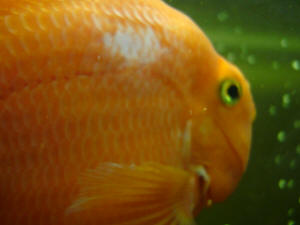 
Re : fish sickness inquiry
8/18/11
They are with Angel fish, Bala shark, eel. no one hurts them.
<Well, something damaged this fish.>
it started with one of them like 4 months ago, and now another is
affected.
<Do also be aware of Hexamita and Hole-in-the-Head infections.
These are VERY common with large cichlids. Nitrate concentration
above 20 mg/l is usually the triggering factor. But poor diet is
also important (lack of vitamins, fresh green foods). Also lack
of oxygen / excessively warm water can trigger these two diseases
as well. Do read:
http://www.wetwebmedia.com/fwsubwebindex/hexoctfwfs.htm
http://www.wetwebmedia.com/metranidazole.htm
http://www.wetwebmedia.com/fwsubwebindex/fwhllefaqs.htm
Hexamita is a gut infection, typically revealed by long,
colourless faeces and a general weakening of the fish.
Hole-in-the-Head begins with the appearance of "pits"
on the skin, usually where sensory pores are located.
It is not 100% clear that the two diseases are always connected.
Sometimes fish infected with Hexamita go on to develop
Hole-in-the-Head, so it is widely, though not universally,
assumed the two diseases are closely related.>
regards
Ralph
<Cheers, Neale.>
Re : fish sickness inquiry 8/18/11
Hi,
What kind of green food can I feed them?
<Cooked or canned peas are good. Also cooked spinach. Some
fish need to be hungry to eat them, so don't feed for a few
days beforehand. You can also buy wet-frozen Spirulina-enhanced
Brine Shrimp. These are very rich in vitamins and fibre, and an
EXCELLENT supplemental food for all freshwater
fish.>
I feed them actually Red Parrot Granules,
<Adequate, but lacking in fibre.>
and dried blood worms.
<Again, useful, but too much dried foods tend to cause
constipation in fish.>
thanks
Ralph
<Cheers, Neale.>
|
Perrot fish Sick? 8/6/11
I had my tank for over 2 years I got: a angel fish had 2 but my Cray
fish killed him by cutting is belly open, poor thing)
<As we have said many times here at WWM you should NEVER keep
crayfish and fish together.>
Perrot fish (originally blue, turned white then now orange???) 2 pictus
cat fish Cray fish and my dear snake fish (which I love with my
hearth)o and 2 clown ruby Cichlid and a blue Gourami
<How big is this aquarium? Blood Parrot Cichlids are quite
aggressive and large, Pimelodus pictus are SCHOOLING fish and get quite
large as well, Snakeheads can get extremely larger and are notoriously
aggressive in some cases, and "Clown Ruby Cichlid" is
probably Mikrogeophagus altispinosus, a dwarf species easily bullied by
larger tankmates. On top of this Blood Parrot Cichlids require hard
water, whereas Mikrogeophagus want soft water, so it's unlikely you
have the right water chemistry for all your fish.>
My Perrot fish as develop brown spot on is upper back and now on is fin
he eat normally but is not socializing and keeping to himself I tried
Melafix but seems to do nothing ( helped my last angel since he has a
ulcer on is lower fin) don't want to lose my parrot fish since I
like him a lot what to do?
<Need information on your aquarium. My prediction is that this
aquarium is too small. Water quality and water chemistry could both be
causing problems.>
Ph is 7.4 temp is 76 and the rest checks out
<I need the numbers, not your opinions. What is the hardness? What
is the nitrite and/or ammonia concentration? How big is the tank? What
sort of filter do you have? How often do you do water changes?>
any help would be appreciated.
<Read: http://www.wetwebmedia.com/fwsubwebindex/FHParrotCichArtNeale.htm
http://www.wetwebmedia.com/fwsubwebindex/fwdis3setsfactors.htm
>
Simon
<Cheers, Neale.>
Re: Perrot fish Sick? 8/7/11
Well Nitrate oar 0.21 ppm
<Nitrate or nitrite? Note the spelling! NitrAte is fairly harmless,
and 0.2 ppm would be unimportant. But nitrIte at 0.2 ppm is not safe,
and suggests the tank is overstocked, overfed, or
under-filtered.>
and ammonia is at 0 I have a Fluval 105 filter system
<A small filter; ideal for 25 gallons, but only when stocked with
small community fish -- Neon Tetras, Guppies, etc.>
and my tank size is 25 gallon
<Far too small for all these fish.>
with and good air pump, as for water hardness how do u figure that
out?
water change is once a month and filter cleaning is once twice a month
in summer time due to some algae in winter time is once a month since
in winter time algae disappears all together my Snakeheads (did not
know that what they where called) never been aggressive but quite
passive(actually I hand feed him and love to come in my hand)as for
crayfish im trying to sell him he is way to big for my aquarium ( got
him from pet store long ago he looked sick and water was dirty and
unfed) but in most part he just hang out in a corner and teams up with
one of my catfish and protects him (weird?)also just found out I have a
Pleco in there which I thought was dead for more than year haha he
hides very well and is well camouflage hope this helps all try and take
a picture to help also my Mikrogeophagus altispinosus seems pretty
happy in the water there in and seems to be a male and female that im
hopping to breed
hope I did not forget anything
<Your tank is likely not adequately filtered. Also the tank is too
small for this number of fish. Need a bigger tank, at least 55 gallons,
and better 75 gallons. Also a much bigger filter, something like the
Fluval 405 -- ALONGSIDE your Fluval 105. Cheers, Neale.>
Sick blood parrot 1/12/11
Blood Parrot With Internal Infection
Hello Crew, I have a 35 gallon tank in which I had four fish. I did not
populate the tank
until it had cycled and the water tested 0 for ammonia and
nitrites.
Once I thought that the tank could handle fish, I put in a blood
parrot, a blue Acara and two Tiger Barbs. They all were tank mates in
one of my brother's tanks and never had any real problems.
All the fish were fine until the heater failed over a weekend and in
Maine it is very cold and the water got down to 50 degrees. The two
smaller fish died and the two bigger fish seemed to come through it all
right. I have tested the water regularly and am maintaining Ammonia =
0, Nitrites = 0, Nitrates = 10-15, Chlorine = 0, pH = 7.6.
This morning I came into the room and the Blood Parrot was not swimming
as usual. I picked up the decoration that he was hiding under and he
floated to the top and stayed there, upside down and with no energy to
eat.
He also developed big white "splotches" that don't look
like Ich has been described. Please see attached photo for what the
fish looks like today.
I thought maybe Swim Bladder but I am really not sure. My brother has
had this fish for quite a while and it never did this, even when in a
tank with half a dozen other fish. Is it stress? Any advice will be
greatly appreciated.
thank you.
< The stress of the low temperatures has weakened your fishes immune
system and may have caused your parrot cichlid to come down with both
external and internal infections. Keep the water clean and try treating
with a combination of Nitrofuranace and Metronidazole.-Chuck>
5 year old blood parrot ---upside down for over 4
months now------------please help
Parrot Cichlid Swimming Upside Down for 4 Months 11/24/10
I have never asked a question on the internet like this before ---but I
am at a loss of what to do (if anything). I have 2 blood parrots
(bought both as babies about 5 years ago) and both have been very
healthy up until August when 1 of them starting swimming sideways and
upside down. The fish also has
periodic "spasms" or jerky movements across the tank. I have
had her in a separate "holding tank"(6 " netted square
connected to the top of my 30 gallon tank) to feed her medicated fish
food to make sure she gets it and also to prevent the other blood
parrot from attacking her). I did this for several weeks off and on and
then took her out so she would have more swimming room , but I have
kept a separator net barrier in the middle of the tank so the other
blood parrot does not attack her (this only adds to her stress).
Usually when a fish starts swimming sideways and hanging upside down,
it's a matter of days or weeks before they will die, but here we
are 4 months later and she is still alive. I feel like she is dying a
long suffering death but cannot bring myself to "flush" her
out of her misery. There is absolutely no exterior signs of anything.
That is why I only gave her medicated fish food and also salt (one time
dose only) to treat the stress (this is the only thing I could do
according the many phone calls I have made to local fish stores since
there are no exterior signs. She looks perfectly normal & beautiful
on the outside (no bloating). She has been laying upside down for
months now, but she still eats!(or tries to) whenever I feed her (once
a
day and not a large amount). She has to jerk around and really try to
steer herself to the food. Sometimes she gets it and sometimes not. On
some occasions she swims right to the food and I think she may be
getting well, but then she regresses the next day. I did not want to
destroy my tank with all kinds of
water treatments so I do not put those in. My tank has been tested many
times and everything is always perfect in everything. I even took a
water sample twice to local fish stores so they could test and it came
out perfect both times. I keep up my water changes and the temperature
is always steady around 78 degrees. The other blood parrot (which is a
little larger than her) is doing great and so is the one other fish I
have in the tank (catfish) Will this go on for a year? Is it just
"her time" and I have to watch her continue to suffer or
should I put her out of her misery?
If you know of anything else I could do at this point to help her
please let me know forgot to tell you that she also has very
"labored breathing" a lot of the time. What a strong fish to
have held on this long! Want to help her if I can.
< Anytime I get a question like this it makes me think of an
internal infection. The medicated food should have a combination of
Metronidazole and Nitrofuranace in it. There are a few variations so
you need to check the label to make sure you have the right one.
Perfect water means nothing to me. Please check the nitrates. They
should be under 20 ppm . The lower the better. I don't recommend
feeding bloodworms. They may pick up toxins from the mud they are found
in and cause digestive problems. I would recommend treating with both
Metronidazole and Nitrofuranace in a hospital tank. You fish has been
ill for a very long time. The key to a complete recovery is a quick
treatment. It may take some time to see if your fish will respond to
these medications.-Chuck>
Re: 5 year old blood parrot ---upside down for over 4 months
now------------please help
Blood Parrot Swimming Upside Down for 4 Months II 11/24/10
I do not feed them bloodworms, only flake food. I checked the medicated
fish food. It's called antibacterial medicated fish food by Jungle
with NO ingredients listed anywhere. Any idea where I could find this
medicated fish food with the ingredients you listed?
< You have already found it on the internet.>
It's he only medicated fish food the local fish stores carried.
Also, when you said a hospital tank, what is that? Just a separate
little tank filled with water from the big tank (or all new
water??)
< That's about it with some aeration and heat.>
I performed the regular tests (nitrate was one of them) several times,
(the fish store did also--and said the nitrate was good), but it only
gives me a color code to see if it's ok. Is there another test that
gives me the numbers, if so I did not see that in the fish store
either. Do you know where I can get that also??
<Go drsfostersmith.com to find test kits and medications that I have
recommended.-Chuck>
Re: 5 year old blood parrot ---upside down for over 4 months
now------------please help
Parrot Cichlid Upside Down for 4 Months III
11/27/10
1 more question. Do I fill the "hospital tank with new water --or
water from the tank she's already in?
|
|

